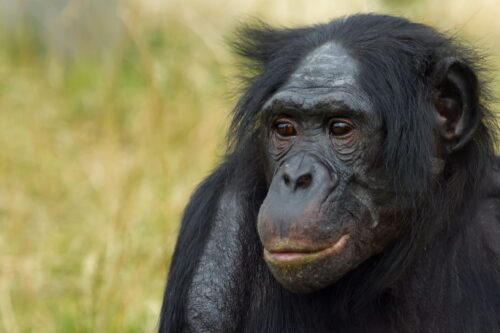Bonobos adjust communication based on perceived knowledge. From Scope, the blog of the Yale Scientific Magazine.
In the field of animal cognition, a central question concerns whether nonhuman primates can attribute mental states—such as knowledge and ignorance—to others and adjust their own behavior accordingly. While humans are adept at tailoring communication based on the mental states of social partners, it remains less clear whether our closest evolutionary relatives demonstrate similar cognitive flexibility.
Johns Hopkins University researchers Luke Townrow, a PhD candidate in comparative social cognition, and Christopher Krupenye, assistant professor in the Department of Psychological and Brain Sciences, explored whether bonobos can attribute mental states to humans. Specifically, they aimed to determine whether bonobos could recognize when a human partner lacked knowledge about the location of a hidden food reward and adjust their communicative behavior accordingly. Bonobos, an endangered primate species native to the Congo Basin, possess sophisticated cognitive abilities, making them ideal subjects for this line of inquiry.
To explore this question, the researchers designed a controlled experiment in which bonobos observed a researcher hide a food item beneath one of three cups, a procedure known as “baiting.” The critical difference involved the human partner’s awareness of the food’s location: In the knowledge condition, the partner observed the baiting, whereas in the ignorance condition, an opaque barrier obstructed their view. Following a ten-second delay, during which the partner expressed uncertainty about the food’s location, the bonobos were given an opportunity to point to the correct cup. The researchers hypothesized that if bonobos could recognize their partner’s ignorance and were motivated to communicate accordingly, they would point more frequently and more quickly when the partner lacked knowledge than when they were informed.
Consistent with this hypothesis, the bonobos exhibited significantly faster and more frequent pointing behavior when their human partner was unaware of the food’s location. This behavioral consistency across all three bonobos studied—Nyota, Kanzi, and Teco—yielded statistically significant results. Moreover, the bonobos’ pointing accuracy exceeded chance levels, indicating that they understood both the location of the hidden food and their partner’s lack of knowledge.
“They are not only able to communicate, but also to understand when someone else lacks knowledge, a capacity previously considered uniquely human,” Townrow said. This finding challenges earlier theoretical frameworks, which posited that, although primates may track others’ mental states, they fail to apply that understanding in communicative contexts. Instead, it reveals that bonobos can recognize their partner’s ignorance and adapt their behavior to facilitate cooperative interaction.
By establishing that bonobos can act upon another’s lack of knowledge, the research provides compelling evidence that the theory of mind—specifically, the ability to communicate based on mental state attributions—is not exclusive to humans. Rather, it may be a shared trait with our closest evolutionary relatives. This evidence points to deep evolutionary roots for the cognitive mechanisms that underpin complex social coordination, offering critical insights into the development of human social cognition.
Townrow identifies a pivotal question for future inquiry: Can apes communicate in a manner that changes another’s mental perspective, rather than merely guiding behavior? He contends that this distinction is essential for understanding the cognitive boundaries of human uniqueness. Although Townrow regards the current findings as an important advance, he emphasizes the need for continued exploration. “The next stage for us is to design experiences that provide similar evidence from different angles,” Townrow said. Replicating the study across diverse contexts, populations, and species can determine whether the observed effects reflect broader species-wide capacities or are specific to this sample. Such research will foster a more nuanced understanding of the evolutionary trajectory of social cognition and help bridge the divide between human and nonhuman primates in the study of mind and communication.

